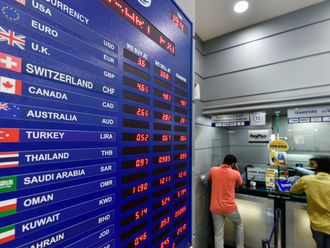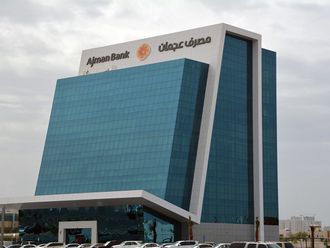Dubai: Gulf issuers are turning to the Islamic bond market like never before, selling record amounts of debt compared with non-Sharia compliant sellers, as demand for sukuk pushes yields to the lowest levels since 2005.
Gulf Cooperation Council Islamic offerings totalled $17.4 billion (Dh63.91 billion) this year, twice the $8.7 billion for non-Sharia compliant bonds, according to data compiled by Bloomberg. Qatar increased 2012 sales over the previous full-year record last week with a $4 billion offer. The spread between the average yield on Gulf sukuk and non-Islamic debt shrank 24 basis points this year to 53 basis points, according to HSBC/Nasdaq indexes.
Growth in Islamic banking assets and insufficient sukuk supply are helping drive sales in an industry forecast by the Kuala Lumpur-based Islamic Financial Services Board to triple to $2.8 trillion by 2015.
Banque Saudi Fransi in Saudi Arabia and Majid Al Futtaim Holding LLC in the UAE are among issuers that tapped the Islamic market for the first time this year, according to data compiled by Bloomberg.
“There are signs that the sukuk market is maturing,” Ahmad Al Anani, the Dubai-based director for the Middle East at investment bank Exotix Ltd, said by phone yesterday.
“We are starting to see appetite from investors for sukuk beyond the traditional five-year sweet spot with new deals printing in the seven- to 10-year range. Moreover we are seeing non-government entities coming to market.”
Demand soars
The last time sukuk sales in the Gulf outpaced non-Islamic bonds was in 2007, when the securities accounted for $16.2 billion of the $26.1 billion of bonds issued.
The average yield on Islamic notes in the region has fallen 85 basis points, or 0.85 percentage point, this year to 3.46 per cent yesterday. It dropped to 3.45 per cent on July 17, the lowest in more than seven years, the HSBC/Nasdaq Dubai GCC US Dollar Sukuk Index shows.
Majid Al Futtaim, an operator of malls and hotels in the Middle East, sold $400 million of bonds in January, while Banque Saudi Fransi, partly owned by Credit Agricole SA, sold $750 million of Islamic bonds in May.
Qatar obtained $25 billion in bids for its sale of five- year and 10.5-year Islamic bonds, two people familiar with the matter said July 11.
The notes maturing in January 2023 were priced at a profit rate of 3.241 per cent, the lowest ever for Qatar and more than double the 1.487 per cent yield on 10-year US Treasuries at the time of the sale.
‘Cash in hand’
“On the demand side, several large sukuk have recently matured,” including Jebel Ali Free Zone FZE, DIFC Investments LLC and Dar Al-Arkan Real Estate Development Co, Nick Stadtmiller, the head of fixed-income research at Emirates NBD PJSC, the UAE’s biggest bank, said in an email yesterday. “The holders of those sukuk thus have cash in hand that they are looking to deploy back into the sukuk market.”
Jebel Ali, a business park operator in Dubai, settled a Dh7.5 billion sukuk in June ahead of the bonds’ November maturity. DIFC, which owns properties in Dubai’s tax- free financial centre, paid back a $1.25 billion sukuk earlier that month. Dar Al-Arkan Real Estate Development Co in Saudi Arabia repaid a $1 billion sukuk this week.
“Sukuk investors tend to have longer time horizons for their investments, and hence sukuk are not as volatile during general sell-offs in other risk assets,” Stadtmiller said.
“Within the region, sukuk are considered safer investments because they tend to be more stable.”
The debt crisis in the Euro-region, along with slowing growth in the US and China, are prompting investors to avoid riskier assets, Stadtmiller said.
Federal Reserve Chairman Ben S. Bernanke said this week the Fed may take further action to boost the recovery.
The US economy was described as growing at a “moderate pace” pace in the bank’s June Beige Book survey. Growth in China may slow to 8.2 per cent in 2012 from 9.2 per cent last year, according to the median estimate of 27 economists surveyed by Bloomberg.
Spain agreed to a 100 billion-euro (Dh450.9 billion) bailout for its banks last month, joining Greece, Ireland, Portugal and Cyprus in asking for a lifeline.
Diminishing spread
While the sukuk market is still growing, more issuances are expected to push yields higher, narrowing the gap between Islamic bonds and non-Sharia compliant debt, Exotix’s Al Anani said.
“There is at present a spread deferential between the sukuk and conventional market which I attribute primarily to technical factors and I expect will gradually diminish as this segment grows in terms of depth and liquidity,” he said.
At the same time, Islamic debt allows borrowers to tap “a wider audience and greater demand, which has typically led to more attractive pricing and cheaper funding,” Alanani said. “Appetite from the Sharia-compliant investor seems insatiable today.”












